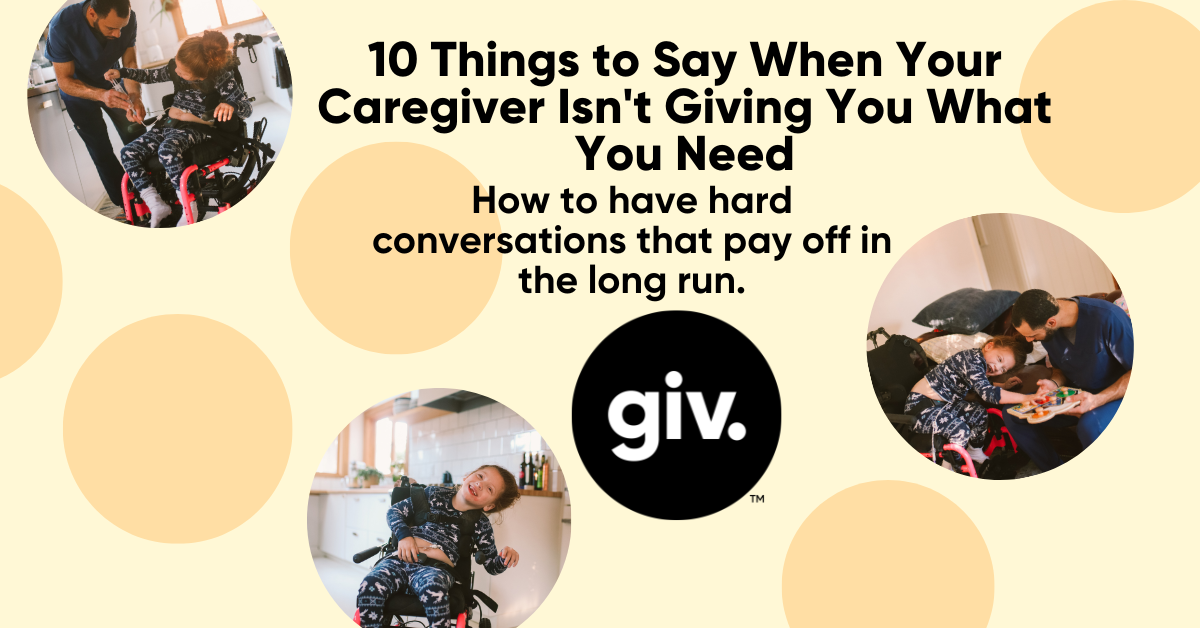As a caregiver, the job of providing care and support to individuals with disabilities, chronic illnesses, or the elderly is one of the most challenging yet rewarding jobs one can take. But what happens when caregivers are not giving the level of care that is needed or expected? What do you say? What do you do? This blog post aims to answer those questions by providing 10 things you can say when your caregiver isn’t giving you what you need.

10 Things to Say When Your Caregiver Isn’t Giving You What You Need
Here are 10 things to say when your caregiver isn’t giving you what you need. The hope is that this would be a way to increase quality of care, improve the client-caregiver relationship, and help everyone get their needs met in an appropriate way.
“I appreciate everything you do, but I need more help with [specific task].”
Caregivers have a lot on their plates, and it’s easy for them to overlook some of the tasks you need assistance with. It’s essential to communicate your needs to them directly. Be specific about what you need help with, and let your caregiver know that you need more support in that area.
“Can we sit down and discuss my care plan together?”
Having a care plan in place can help ensure that your needs are being met consistently. However, sometimes caregivers may not adhere to the care plan. In this situation, ask your caregiver to sit down with you and go over your care plan together to make sure everyone is on the same page. You may find that adjustments need to be made, or perhaps, the caregiver needs further training.
“I understand that you’re busy, but I need you to prioritize my needs.”
Caregivers often have many responsibilities, and it’s easy for them to get overwhelmed. It’s essential to communicate that your needs are a priority. Let your caregiver know that you need their attention and support.
“Can you explain to me why you’re not able to provide the care I need?”
Sometimes, caregivers may not be able to provide certain types of care due to limitations or other factors. Asking for an explanation can help you understand the situation better and find alternative solutions. It’s important to note that some care may require specialized training, and the caregiver may need to request additional help from the agency or organization they work with.
“I feel like you’re not listening to me. Can we talk about why?”
Communication is key, and it’s crucial to express your feelings in a non-confrontational way. If you feel like your caregiver isn’t hearing your concerns, bring it up directly. Explain why you feel that way, and ask your caregiver to actively listen to your needs.

“I’d like to involve a family member or advocate in my care.”
Involving a third party, such as a family member or advocate, in your care can help ensure that your needs are being met appropriately. If you don’t have a family member or advocate already involved, ask your caregiver if they would be willing to work with someone else. It’s important to have someone in your corner who can help advocate for your needs.
“I’m not comfortable with the way you’re providing care. Can we explore other options?”
If you’re not happy with the level of care you’re receiving, it’s important to speak up. Ask your caregiver if there are alternative options for care that could better meet your needs. In some cases, you may need to work with a different caregiver or agency to find a better fit.
“I need more information about my condition and how to manage it.”
Education about your condition can help you better manage your care and communicate your needs more effectively. Ask your caregiver for more information about your condition and any resources that may be available to you. You can also request to work with a specialist who can provide you with further knowledge.
“I’m feeling overwhelmed. Can you help me find additional support?”
Caregivers may not always be able to provide all of the support you need, but they may be able to help you find additional resources and support. If you’re feeling overwhelmed, ask your caregiver if they can help connect you with community resources, support groups, or other professionals who can provide additional assistance.
“I appreciate all that you do, but I need a break.”
Caregiving is a demanding job, and caregivers need breaks too. If you’re feeling like you need some time off from caregiving responsibilities, communicate that to your caregiver. They may be able to help arrange for respite care or provide suggestions for other resources that can help give you a break.

In conclusion, communicating with your caregiver about your needs is crucial for receiving the care and support you require. It’s important to remember that caregivers are human and may make mistakes or have limitations. By expressing your needs and concerns in a respectful and direct manner, you can work together to find solutions that work for everyone involved. Ultimately, effective communication is the key to building a successful caregiving relationship. Hopefully these 10 things to say when your caregiver isn’t giving you what you needs helps to improve the overall relationships and quality of care you receive.
If you liked this post, you might also like:
- All About Caregiver Compensation
- Different Kinds of Caregivers
- What Caregivers Need to Know






